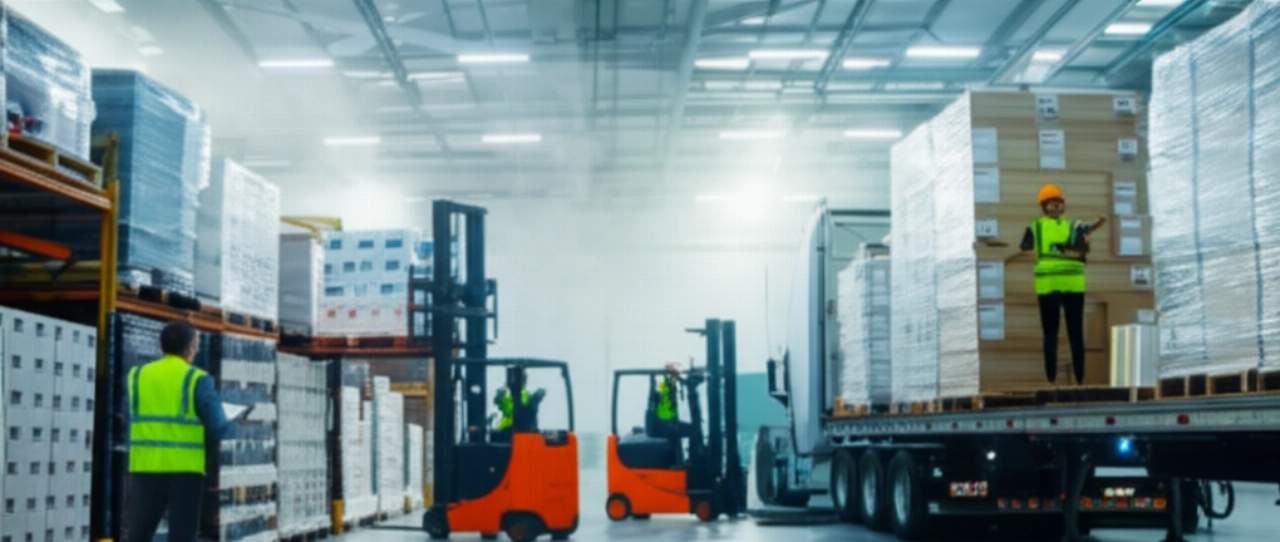Is shipment management becoming the bottleneck hindering your business growth? Or perhaps you need to ship that bulky machinery or precious family furniture, and anxiety about costs and integrity keeps you awake at night?
Understanding the true cost of an LTL shipment (Less Than Truckload) and finding a reliable partner can seem like a labyrinth of vague quotes, hidden clauses, and unfulfilled promises. Whether you're a company looking to optimize your logistics or an individual with a valuable cargo, uncertainty is the number one enemy.
In this comprehensive guide, we won't just give you numbers. We'll provide you with a map to navigate the world of partial freight transport, understand real costs, and choose a partner you can trust. We'll show you how to transform the complexity of LTL shipping into a competitive advantage and a guarantee of peace of mind. Let's begin your journey towards clear and reliable logistics.

Beyond Delivery: Why Reliable LTL Shipping is an Investment, Not a Cost
Many view LTL shipping as a mere cost item, a necessary evil. But if your goods are the heart of your business or an item of sentimental value, reliable transport transforms into a true investment. Why? Because it protects you from losses, damages, delays, and, most importantly, from unexpected costs that can erode your margins or your peace of mind.
Well-managed and integrated logistics for your partial loads means:
- Risk Reduction: Lower probability of damage or loss thanks to adequate packaging and standardized procedures.
- Time Optimization: Punctual deliveries that respect your lead times and your customers' expectations.
- Cost Control: Clear quotes that eliminate surprises, allowing for precise financial planning.
- Intact Reputation: For businesses, impeccable shipping service translates into satisfied and loyal customers. For individuals, the certainty that your item will arrive intact.
It's not just about moving an EPAL pallet or machinery; it's about safeguarding the value it contains and your peace of mind.

The Transparent Quote Formula: The 5 Factors That Determine the Cost of Your LTL Shipment
Have you ever wondered why two quotes for the same LTL shipment can be so different? The key lies in understanding the factors that influence the price. Being informed allows you to ask knowingly and recognize a truly transparent offer.
Here are the pillars on which the cost of partial transport is based:
- Weight and Volume of Goods: Not only the actual weight (kg), but also the volumetric weight (or chargeable weight) is crucial. This calculation considers the space your goods occupy on the vehicle. Light but very bulky goods might cost more than heavy but compact ones.
- Distance and Destination: Obviously, the longer the route, the higher the cost. But the type of destination (historic center, ZTL, island, remote location) can also affect surcharges.
- Type of Goods and Packaging: Fragile, dangerous, or valuable goods require specific attention and packaging (e.g., metal cage for motorcycles, wooden crates for artworks) which can increase the cost but guarantee safety. A well-packed pallet reduces risks.
- Additional Services Required: Home collection, floor delivery, hydraulic tail lift, "all risks" insurance (beyond basic carrier's liability insurance), urgent or dedicated delivery times (e.g., delivery by 12:00 PM) are all services that affect the final price.
- Frequency and Volume of Shipments (for businesses): If you are a company with groupage needs or regular shipments, you might benefit from more advantageous contractual rates compared to a single shipment.
Understanding these factors puts you in a strong position. Don't just ask 'how much does it cost?', but 'how was this cost calculated?'

The Trap of Saving at All Costs: The 3 Mistakes to Avoid When Choosing LTL Shipping
The temptation to choose the cheapest offer is strong, but in the world of LTL shipping, immediate savings can turn into a much higher cost. Here are the most common mistakes we warn you against:
- Relying on the "Improvised Courier" or Low-Cost Platforms Without Guarantees: The cousin with the van or online platforms promising rock-bottom prices often don't offer adequate insurance coverage, traceability, customer support, or the management of the consignment note (CMR). The risk of damage, loss, or delays is very high, and the "savings" vanish in the face of damage.
- Ignoring Quote Details: A "too good to be true" quote almost always hides additional costs. Surcharges for fuel, tolls, ZTL, handling of oversized packages, or undeclared demurrage costs can inflate the final price. Always ask for a detailed and "all-inclusive" quote.
- Underestimating Packaging: Believing that "the courier will take care of it" is a serious mistake. Packaging is the first line of defense for your goods. Inadequate packaging can invalidate insurance and cause irreparable damage. A specialized courier will give you precise instructions, but the primary responsibility is yours.
Our experience teaches us that transparency and professionalism are the only true long-term savings.
The Difference Between a Carrier and a Logistics Partner: The TrasportoMerci.net Method
By now, you'll have understood that shipping an LTL load isn't just about finding a truck. It's a matter of trust, precision, and partnership. We at TrasportoMerci.net are not just carriers; we are your logistics consultants.
Our method is based on:
- Total Transparency: Every quote is clear, detailed, and without surprises. We explain every cost item, from groupage to volumetric weight management, up to surcharges for specific areas.
- Care and Safety: We treat your goods as if they were our own. Whether it's a grand piano, industrial machinery, or a load of pallets for your company, we guarantee maximum care, with state-of-the-art fastening systems and trained personnel.
- Dedicated Consultation: We guide you step by step, from choosing the most suitable packaging to filling out the consignment note. We are here to simplify bureaucracy and answer all your questions.
- Technology and Traceability: We constantly monitor your shipment, providing you with real-time updates. Your peace of mind is our priority.
With TrasportoMerci.net, your LTL shipment is not a problem to solve, but a journey to optimize together.
Frequently Asked Questions about LTL Shipping
We know that every shipment generates questions. Here are the answers to the most common ones, to give you even more clarity:
- How long does it take for an LTL shipment to be delivered?
- Delivery times for an LTL shipment vary based on distance, destination, and the type of service chosen (standard, express). Generally, for national routes, it ranges from 24-48 hours for major cities to 3-5 business days for islands or more remote locations. We will provide you with a precise estimate in the quote.
- Is my goods insured during LTL transport?
- Yes, every shipment is covered by the mandatory carrier's liability insurance by law (Law 450/85 and subsequent amendments). This covers loss or damage within the limits established by law. For high-value goods, we strongly recommend additional "all risks" insurance, which offers broader and more personalized coverage. We will guide you in your choice.
- What happens if I'm not home/at the company at the time of delivery?
- Before delivery, you will be contacted to arrange a time. In case of absence, the courier will attempt a second delivery. If this also fails, the goods will go into storage, and additional costs may apply. It is essential to ensure someone is present for collection or delivery.
- How should I pack my goods for an LTL shipment?
- Packaging is crucial. Goods must be adequately protected to withstand impacts and vibrations during transport. For fragile or valuable items, we recommend professional packaging such as wooden crates, metal cages, or high-density bubble wrap. For pallets, ensure the goods are well secured and shrink-wrapped. We will provide detailed guidelines based on your goods.
- Can I track my LTL shipment?
- Absolutely. Every LTL shipment receives a tracking number. You can monitor the status and location of your goods in real-time through our online portal or by contacting our customer service. Transparency is at the heart of our service.
Now you know exactly what to look for when choosing an LTL shipping service that guarantees safety and transparency, without anxiety or surprises. You have the map to navigate costs, pitfalls, and professional solutions.
Perhaps you think a professional service is too expensive or complicated to organize. In reality, the biggest cost is uncertainty, damage to goods, or loss of valuable time. A reliable partner saves you time, money, and stress, transforming your logistics into a true competitive advantage.
Stop wasting time comparing incomprehensible quotes or worrying about your goods. Your LTL shipment deserves a safe journey, and you deserve peace of mind. The first step costs nothing: it's a consultation on your specific transport need. Click here, describe what you need to ship – whether it's a single pallet, machinery, or a groupage load – and receive a clear, detailed, and no-obligation quote. Discover the best solution for you now and turn your logistics into a strength!
Now that you know everything about LTL shipping, you might want to delve deeper:
- Discover the difference between Groupage Transport and Full Truckload (FTL) to understand which solution best suits your needs.
- Learn How to Professionally Pack a Pallet to ensure maximum safety for your goods.
- Deepen your understanding of Volumetric Weight: How it's Calculated and Why it's Important to avoid cost surprises.